

Thermosets demonstrate outstanding mechanical and physical properties, especially in high-temperature operating conditions which is why they have an array of applications in areas where a durable material that is capable of withstanding aggressive environments is a priority.
Thermosets are a popular choice for challenging applications that especially require heat-stable components and it is also cost-efficient against similarly-performing engineered plastics. In this article, we discuss the various properties of thermosets and their applications in detail.
A thermosetting polymer is a type of polymer that consists of heavily branched molecules or cross-linked structures. Thermosets are primarily synthetic composites that strengthen upon heating but once formed, they cannot be remolded.
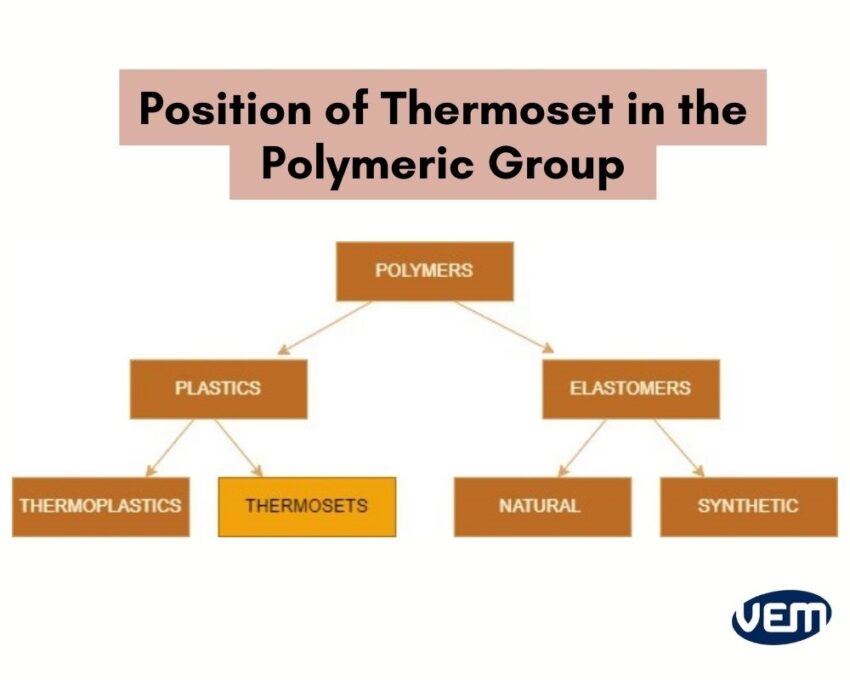
A thermoset is formed by curing i.e. permanently hardening a soft solid or viscous resin. The curing leads to the covalent bond formation and substantial cross-linking between the polymer chains which leads to the formation of an infusible polymer network. The curing rate can be increased by increasing the pressure, adding a catalyst, or a hardener.
Thermoset plastic parts demonstrate excellent dimensional stability and can withstand extreme temperatures of up to 204 – 260℃ / 400-500℉. They are also UV resistant and can withstand corrosion, and aggressive chemicals thus, making thermosets ideal for automotive, and outdoor applications. They are also applied in electrical applications as thermosets also demonstrate exceptional electrical properties such as strong insulation and dielectric strength.
Thermosets can be molded via injection, compression, or transfer molding techniques. Thermosets are typically molded into an extremely hot mold (176℃ / 350℉) which creates a permanent molecular bond thus, giving the molded part its end properties. The polymer upon heating undergoes an extensive and irreversible cross-linking in the mold.
Thermoset polymer has links between the polymer chains which restricts the movement between them thereby, making them tough and resistant to heat.
A monomer is a reactant in the thermosetting polymer and a cross-linker joins two or more monomer strands together in the polymer chain.
A thermoset monomer must have at least three reactive ends, with its molecular chains crosslinking in three dimensions as opposed to thermoplastic monomers that have only two reactive ends for linear chain growth.
The following diagram depicts the molecular structure of thermosets:
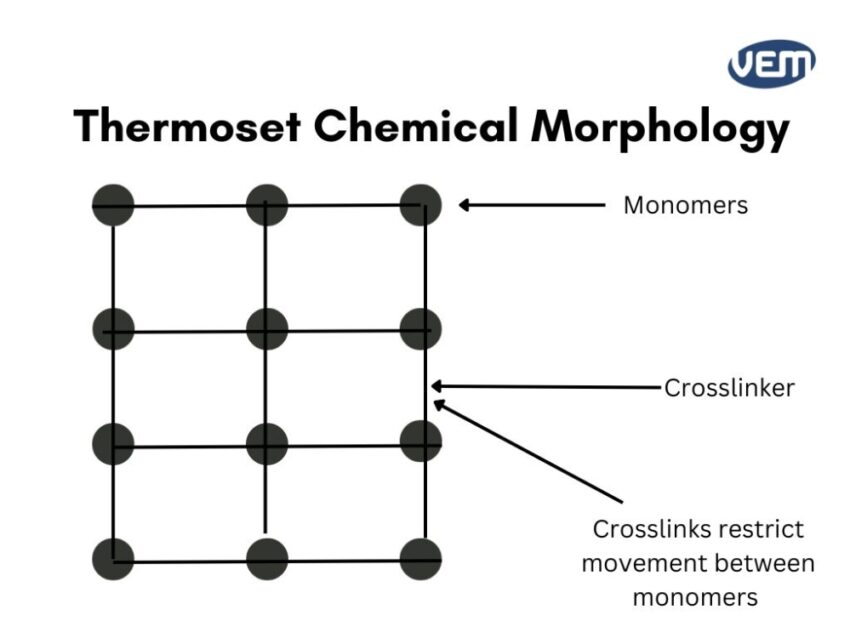
Let’s understand some of the innate properties of thermoset polymers:
Polyurethane thermosets are tough, abrasion-resistant, and flexible. They are used to manufacture a wide range of consumer goods such as footwear soles, print rollers, and mobile phone cases.
Melamine resin is a type of nitrogen-rich, organic thermoset that is mainly used to manufacture various types of kitchenware such as plates and cooking tools.
Melamine is an extremely tough and flame-resistant thermoset thus, it’s an apt choice for kitchen tools.
Fiberglass is a fiber-reinforced polymer composite of glass fibers within a resin matrix. It’s a strong, lightweight, and rigid plastic-based material with various applications.
Fiberglass is applied to manufacture various water sports equipment, such as surfboards, and automotive parts.
Bakelite is a phenol-formaldehyde resin and a poor conductor of heat and electricity which is why it is commonly used to manufacture electrical switches and appliances that are exposed to heat such as saucepan handles.
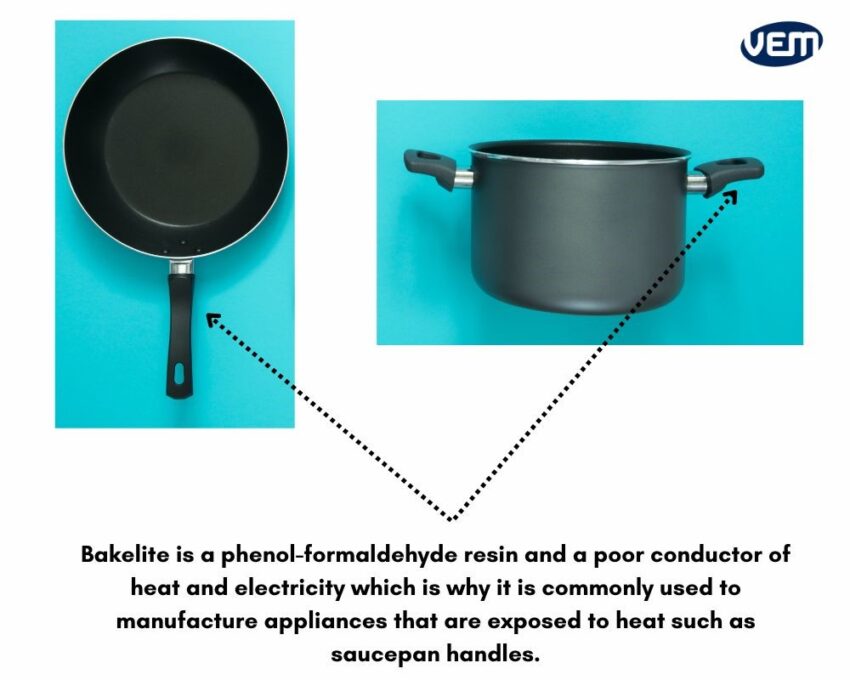
Vulcanized rubber is a type of thermoset plastic that’s manufactured from altered rubber and has an opaque finish. It’s commonly used for manufacturing fountain pens, pipe stems, and combs.
Epoxy resin is a thermoset plastic that demonstrates excellent strength and rigidity applied in the construction, heavy industry, and commercial sectors.
There are 3 stages to manufacturing with thermoset polymers. Let’s understand these stages further:
The first stage is the ‘resole stage’. In this stage, the resin is insoluble and in fusible conditions. At this stage, the thermoset polymer is ready for molding and further stages.
At this stage, heat is applied and the thermoset polymer becomes partly soluble which commences the chemical reaction. The increase in temperature and applied pressure promotes the cross-linking of the long-chain molecules. This is a temporary state as the molten form of the thermoset lasts for a short time-frame and in this stage, the characteristics and changes are still reversible.
In this stage, the cross-linking reaction is complete and the molten polymer forms a permanent and solid three-dimensional structure. This stage includes the molding phase, where the molten resin cools to solidify into the part. When this stage is complete, the part cannot be reheated or remelted.
Thermosets and Thermoplastics are two different groups of plastics that have distinct properties and characteristics.
If thermosetting plastic is irreversibly rigid when subjected to heat, thermoplastic polymers are more pliable. Due to the internal cross-linking via covalent bonds, thermosets tend to be stronger than thermoplastics, and for this particular reason, they exhibit higher resistance to heat, temperature, and corrosion. However; thermosets are more brittle and likely to permanently deform than thermoplastics.
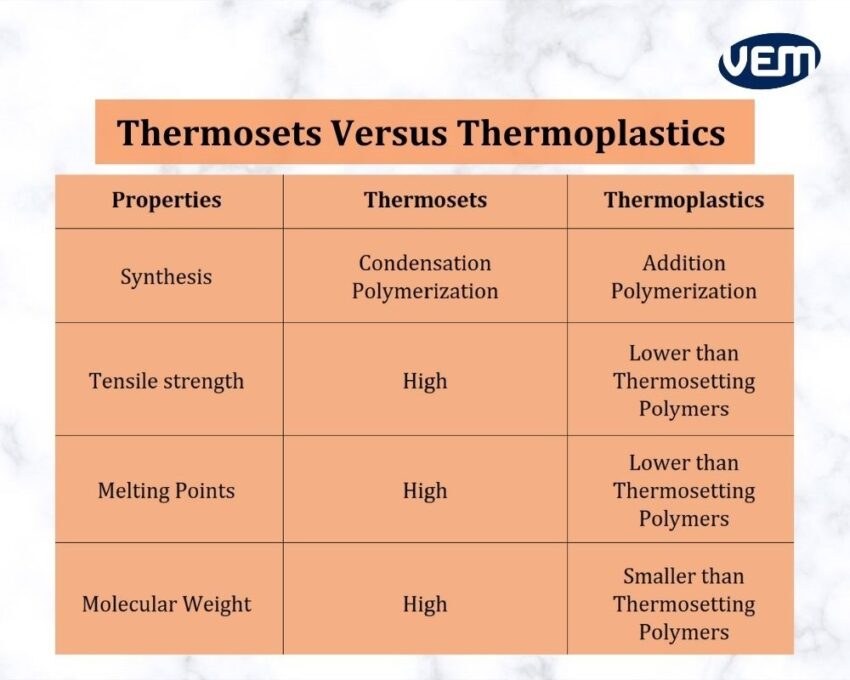
Thermosets cannot be remolded or reheated, but they are apt for high to very high-temperature applications whereas thermoplastics can be remolded and recycled.
If you would like to learn more about the similarities and distinct differences between the 2 sets of polymers, you can read the Thermoplastic versus Thermosets article. It enlists the details that you must go through to choose the right category of polymer for your project.
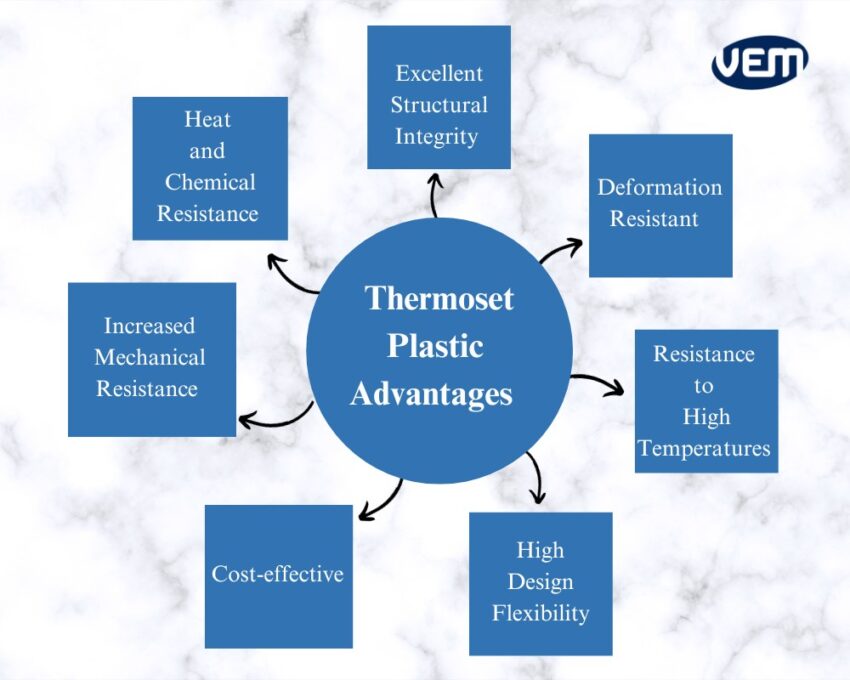
There are various challenges with thermoset polymers such as they cannot be recycled, reshaped, or remolded. In addition, it is challenging to receive a smooth surface finish with thermosetting polymers.
Thermosetting polymers solidify during the molding process and cannot be remolded however; they are an apt choice for manufacturing parts that require improved mechanical properties, structural integrity, and chemical and heat resistance.
If you have any questions about Thermosets, contact us and we will get back to you with solutions. We have made molds and parts with a variety of thermosets for over 20 years and our team will surely be helpful for your project.